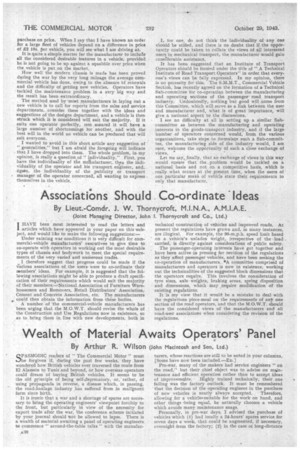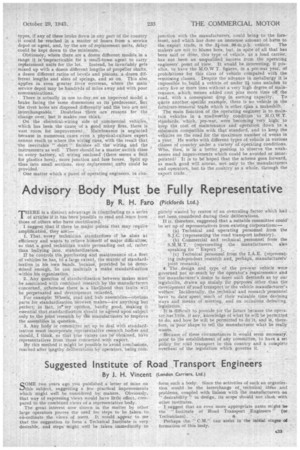Wealth of Material Awaits Operators Panel
Page 32

Page 35

If you've noticed an error in this article please click here to report it so we can fix it.
By Arthur R. Wilson
(JOhn Macintosh and Son, Ltd.) QPASMODIC readers of "The Commercial Motor" must Obe forgiven if, during the past few weeks, they have wondered how lEiritish vehicles ever traversed the route from El Alamein to Tunis and beyond, or how overseas operators could dream of buying British vehicles. It seems to be the old principle of being self-deprecatory, or, rather, of using propaganda in reverse, a disease which, in passing, the road-haulage industry has suffered from in malignant form since birth, • It is ironic that a war and n shortage of spares are necessary to bring the operating engineers' viewpoint forcibly to the front, but particularly in view of the necessity for export trade after the war, the conference scheme initiated by your journal should aiot be allowed to lapse. There is a wealth of material awaiting a panel of operating engineers to commence " around-the-table talks " with the manufac 'hirers, whose reactions are still to be noted in your colunins., [Some have now been included—ED.] Pre-war, many of the makers had service engineers " on the road," but their chief object was to advise on maintenance and efficient operation rather than to accept ideas of improverne3its. Highly trained technically, their one failing was the factory outlook. It must be remembered that the decision of the operating engineer in the purchase
of new vehicles is nearly always accepted. Therefore, allowing for a vehicleesuitable for the work On hand, and other things -being equal, he naturally chooses a vehicle which avoids many maintenance snags.
Personally, in pre-war days, I advised the purchase of vehicles which (I) had locally a 24-hours' spares service for seven days a week, that could be augmented, if necessary, overnight from the factory; (2) in the case of long-distance types, if any of these broke down in any part of the country it could be reached in a 'matter of hours, from a service depot or agent, and, by the use of replacement units, delay could, be kept down to the minimum.
Obiriously, where there are a dozen different models in a range it is 'impracticable for a small-town agent to carry . replacement units for the lot. Instead, he invariably gets mixed up with a dozen different lengths of propeller shafts, a dozen different ratios of bevels and pinions, a dozen different lengths and sizes of springs, and so on. This also applies in even greater force overseas, where the main service depot may be hundred of miles away and with poor
communications.
There is actually in-use to-day_on an improved model a brake facing the same dimensions as its predecessor, But the rivet holes are disposed differently and the'tvio are not interchangeable. Doubtless there are reasons for the -change over, but it makes one think.
On the electrical-wiring side' of commercial vehicles, which has been the cause 'of a good many fires, .there is. vast room for improvement. • Maintenance is neglected because in numerous cases even a physical-etilture expert cannot reach to where the wiring runs, with the result that 'the inevitable " short finishes all thewiring and the instruments as well There should be a master switch Close to every battery, all wiring-enclosed (there, seems a field for plastics here), more junction and fuse boxes. Split up __ thus into small sections, easy replacement. untts could be provided.
One matter which a panel of operating engineers, in con junction with the manufacturers, could bring to 'the forefront, and which has done an immense amount of harm to the export trade, is the 24-ton .30-M.p.h. vehicle. The makers are not to blame here, but, in spite of all that has been said or done, this type of vehicle, as a load carrier, has not been. an Unqualified success from the operating, engineers' point of view. It would be interesting; if possible, to have the M.O.W T. figures, in a pre-war year,' of prohibitions for this class of vehicle compared with the remaining classes. Despite the advance in metallurgy it is impossible to build a vehicle of under 24 tons unladen to carry five or more tons without a very high degree of maintenance, which means added cost plus more time off, the road; With a consequent drop, in earning capacity. To 'citiote another, specific example, there is no vehicle in the furniture-rernoVal trade Which is other.tlian a makeshift.
The main function of the operating engineer is to main
tam vehicles in a roadworthy condition. to M.O.W.T. standards, 'which, pre-war, were becoming 'Very high; to keep the cost of maintenance and operation down to a minimum compatible with that standard, and to keep the vehicles on the road for the maximum number of weeks in a year. He works with different types of vehicle in various classes of country under a variety of operating conditions. Who, then; is in a better position to observe the weaknesSes and improvements. which could be avoided or incorporated? It is to be hoped that the scheme goes forward, as much good will Accrue, not only to the manufacturers and operators, but to the country as a whole, through the export trade..




















































